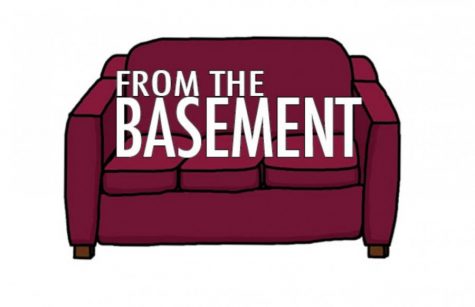From the Basement: “Indisputable video evidence” no longer a viable excuse for blown calls

Tulane fans saw their dreams of going to a bowl game for the first time since the 2013 New Orleans Bowl dashed when junior quarterback Jonathan Banks was seemingly brought down on the 1-yard line by a Southern Methodist University defender, stopping the Wave comeback — literally — inches short on Nov. 24.
The response on social media was instantaneous. Tulane fans in addition to those who casually tuned in voiced their confusion as to why the call was not reversed. Even upon video replay, the referees upheld their call that the Mustangs had halted Banks’ progress, despite video from CBS camera crews showing Banks rolling over the defender who tackled him, knees never touching the ground as he went over the goal line. Tulane lost 41-38, one yard short of a bowl bid.
In hindsight, it is easy to understand why the call was not reversed. Banks might have scored a touchdown, but there was not enough undeniable video evidence to prove it beyond a reasonable doubt.
Fans of football are familiar with this predicament. When referees cannot find enough suitable evidence to prove they did not made the correct call originally, there is a slim chance that the call will be overturned after checking the replay footage.
A lack of indisputable video evidence has controversially cost many teams victories, a prominent example being the infamous “Fail Mary” game between the Seattle Seahawks and Green Bay Packers in 2012, which was decided during the final play of the game on a Hail Mary pass from Seahawks quarterback Russell Wilson. Though it appeared that the pass might have been intercepted by Green Bay, the pass was ruled a touchdown, and then the call stood after a review of the footage.
Should a call be declared wrong days or weeks after the event, organizations make little effort to acknowledge that the call should have been reversed. In the aftermath of the Seahawks-Packers game, the NFL released a statement that declaring it stood by the ruling, but it also addressed that there was a missed offensive pass interference penalty on Seattle in the replay footage that would have given Green Bay a chance of sealing a victory. These mistakes are inexcusable when they cost teams wins, especially in football, where every single win matters in tight divisions and close matches.
Both the NFL and NCAA receive instant replay footage from the networks that film the game. In the case of the Tulane-SMU game, CBS supplied the footage on the final play. The cameras only caught two angles of the play, one from the top-right side of the field and another from a chest-level goal-line view. The higher camera captured the full view of all the players but was too far away when Banks crossed the plane.
The goal-line view was closer to the play but was obscured by the bodies of Tulane and SMU players. In fact, the clearest shot of the play was taken from an SMU video department staffer who filmed the play from the ground level on the left side of the field. Even so, there is enough evidence to argue that the ball was indeed on the goal line, making the play a touchdown. Since it was not CBS footage, the video could not be used, only surfacing after the game’s conclusion.
With only the two camera angles that CBS provided, it is understandable why the call could not be overturned. That does not mean, however, that something should not be done about it.
Both the NCAA and the NFL need to provide enough cameras to prevent moments like this from happening. Of course, a game between a 5-6 team and a 6-5 team is bound to have fewer resources than a game between two nationally-ranked teams, but that does not excuse having only two camera angles.
One change that could be made would be to require referees to view the call before making a hasty decision that could cost the game for another team. Considering that a call is more likely to be left as it stands than it is to be overturned, this action would help to eliminate bias. Calls may still be missed, and fans may still get angry, but it is better than requiring video evidence to uphold a call when the video evidence is not on hand.
Indisputable video evidence has determined the outcomes of so many football games, especially those that come down to the final play. Now, with Tulane missing out on the chance to attend a bowl game, change needs to be considered, sooner rather than later.
This is an opinion article and does not reflect the views of The Tulane Hullabaloo. Susan is a junior at Newcomb-Tulane College. She can be reached at [email protected].
Your donation will support the student journalists of Tulane University. Your contribution will allow us to purchase equipment and cover our annual website hosting costs.



Leave a Comment